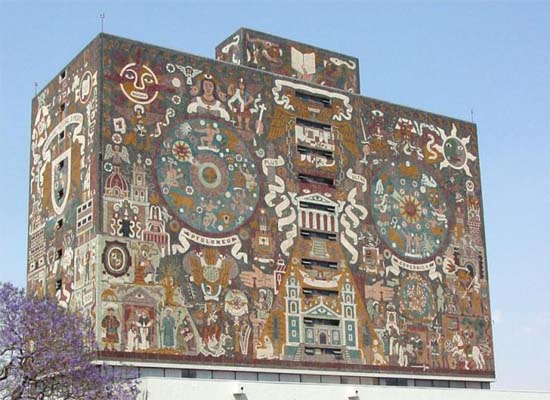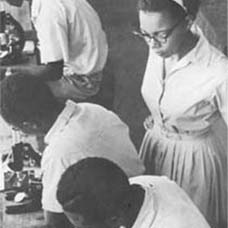
Peace Corps gets chance in Mexico: Grayer group of 13 Americans is service's first in cautious nation
Peace Corps gets chance in Mexico
Grayer group of 13 Americans is service's first in cautious nation
09:20 PM CST on Sunday, November 28, 2004
By LENNOX SAMUELS / The Dallas Morning News
QUERÉTARO, Mexico – Behind the freshly varnished front gates of a neat compound on Bernardo Quintana Boulevard, 13 Americans are quietly establishing a beachhead in U.S.-Mexico relations.
The 11 men and two women are the first Peace Corps volunteers to work in Mexico since the organization was founded in 1961. A fiercely nationalist country, Mexico had declined previous efforts by the far-flung agency to place volunteers on its soil.
[Click image for a larger version]
"It took so long a time because a lot of Mexican people were suspicious that the Peace Corps would get into other areas, like politics, that they didn't want them getting into," said Andrés Rozental, director of the Mexican Council on Foreign Affairs and a former deputy foreign minister. "They were suspicious that there was a hidden agenda."
This Peace Corps contingent, which will work on a variety of highly technical projects, bears little resemblance to the stereotype of native-garbed, twenty-something Americans in sandals digging irrigation ditches in Kenya or teaching geography in Belize.
Volunteers, who sign on for 27 months, are 25 to 64 years old, with an average age of 45 and average work experience of 20 years. Most have postgraduate degrees – three are Ph.D's – and their activities are highly technical and finely targeted.
"I applied to the Peace Corps and had no idea where I would end up," said Veronika Pesinova, a Czech-born Los Angeleno with a master's degree in chemical engineering from the University of California at Los Angeles. "This was a professional program where I could actually use my skills."
Ron Savage, the Peace Corps' associate director in Mexico, noted that over the years, engineers and other professional volunteers have had to give up working in their fields to work in the community.
"We're asking these new volunteers to use that skill to work in very sophisticated environments," he said, "not teaching high school math."
Gaddi H. Vasquez, head of the Peace Corps in Washington, hailed the historic deployment, which came after two years of negotiations with the Mexicans.
"The opportunities for collaboration are going to be limitless," he said in a Mexico City interview.
The volunteers are aware of Mexico's problematic history with the United States, which Washington analyst Larry Birns described as "a bitter relationship, including losing half their territory."
Former President Carlos Salinas de Gortari changed all that by "paring down all the mysteries and the separations," and "right now, Mexico no longer presents mountains to U.S. penetration," said Mr. Birns, director of the Council on Hemispheric Affairs in Washington. "The Peace Corps' arrival is merely another aspect."
Still, the volunteers themselves are determined not to make any waves except the business kind.
"We have to work in such a way that it's their success, not ours," said Peace Corps country director Byron Battle. "We must suggest, rather than come in and say we know it all.
"This group is very sensitive to all that," said Mr. Battle, an economist. "They're not a bunch of kids coming in to have a good time. These are super-competent people who are drawn by the experience of living in Mexico."
Paul Ruesch, a volunteer who is an environmental engineer from Chicago, described the Peace Corps as "good foreign policy."
"This is a nonaggressive, constructive thing," he said. "But the name doesn't help – the word 'corps' makes people think of something else, more military."
The Peace Corps forged its agreement in November 2003 with Mexico's CONACYT, the National Council on Science and Technology.
"The purpose is to increase cooperation in technology areas in our country and to strengthen links of collaboration," said Guadalupe Cassani, CONACYT's assistant director for education outreach. "The Peace Corps' interest is precisely that, to increase international cooperation.
"We're in a global, competitive world. Technological cooperation is an important consideration for every country nowadays."
In a speech at the recent Binational Commission meeting in Mexico City, Secretary of State Colin Powell noted that the corps would work in information technology, small-business development and environmental technology.
Mr. Battle, a Fort Worth native who attended Hillcrest High School in Dallas, said the volunteers were working in four principal areas:
• Environmental and water engineering to reduce industrial contaminants;
• Mechanical and electro-chemical engineering to improve production processes for small companies;
• Information technology and "knowledge management" to help Mexican research institutions transfer technical information to small businesses, municipalities and local governments; and
• Business advising to help small firms survive and increase employment.
"Mexican expenditures on science and technology is pretty low, so they're worried about their competitiveness generally," Mr. Battle said. "They're very reliant on labor-intensive industries – and those industries are going to China.
"They realize it is sophisticated industries like science and technology that will make them competitive with places like Brazil and Chile."
Jorge Gallardo, a CONACYT official at the Mexican Embassy in Washington, acknowledged the country's technology deficit.
"We cannot compete any more on cheap labor, not just with China, but with a lot of other countries," he said. "What we need to prepare for is to have highly skilled people working in better jobs."
The Peace Corps volunteers are from all over the United States and include a married couple from Oregon, Terry C. Gould, an environmental engineer, and Janice Gould, an English teacher. The two said they had reached a point in their lives where they craved a different kind of fulfillment.
"We really felt this was a way that was moving toward that goal," said Ms. Gould.
Ranganath Shastri, a materials/chemical engineer, had left his job with Dow Chemical after 21 years. He saw an ad that said the Peace Corps was looking for people with experience in plastics.
"The motives are different for each of us," said Dr. Shastri. "I used my semi-retirement to do a lot of thinking. I used the time to think about what I want to do – instead of getting back into the rat race."
The volunteers are in training now, mostly to learn Spanish. Ultimately they will work at CONACYT centers in the central part of the country, where they will train Mexicans and work on technical projects.
"I wanted something like this, that goes beyond what I had accomplished in my career," said Amad Doratotaj, a longtime executive with high-tech companies in the northwestern United States. "I wanted to do something that enriches my soul."
E-mail lsamuels@dallasnews.com







